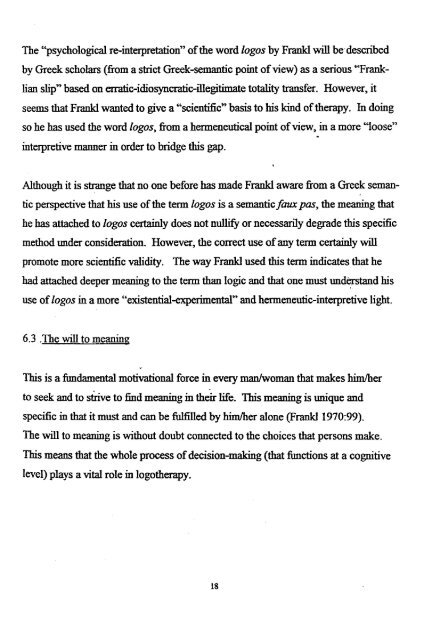View/Open - UZSpace Home
View/Open - UZSpace Home
View/Open - UZSpace Home
Create successful ePaper yourself
Turn your PDF publications into a flip-book with our unique Google optimized e-Paper software.
The"psychological re-interpretation" ofthe word logos by Franklwill be descnbed<br />
by Greek scholars (froma strictGreek-semantic pointofview) as a serious"Frank<br />
lianslip" based on erratic-idiosyncratic-illegitimate totalitytransfer. However, it<br />
seems that Franklwantedto give a "scientific"basis to his kind oftherapy. In doing<br />
so he has used the word logos, from a hermeneutical point ofview, in a more"loose"<br />
interpretive manner in orderto bridgethis gap.<br />
Although it is strangethat no one beforehas madeFrankl aware from a Greek seman<br />
tic perspective thathis use ofthe term logos is a semanticfaux pas, the meaning that<br />
he has attached to logos certainly does not nullify or necessarily degradethis specific<br />
method underconsideration. However, the correctuse ofany term certainly will<br />
promote morescientific validity. The way Franklused this term indicatesthat he<br />
had attacheddeepermeaning to the term than logicand that one must understand his<br />
use oflogos in a more "existential-experimental" and hermeneutic-interpretive light.<br />
6.3 .The will to meaning<br />
This is a fundamental motivational force in everymanlwoman that makes him/her<br />
to seek and to strive to findmeaning in their life. This meaning is unique and<br />
specific in that it must and can be fulfilled by him/her alone (Frankl 1970:99).<br />
The will to meaning is without doubt connectedto the choices that persons make.<br />
This meansthat the wholeprocess ofdecision-making (that functions at a cognitive<br />
level) plays a vital role in logotherapy.<br />
18
















